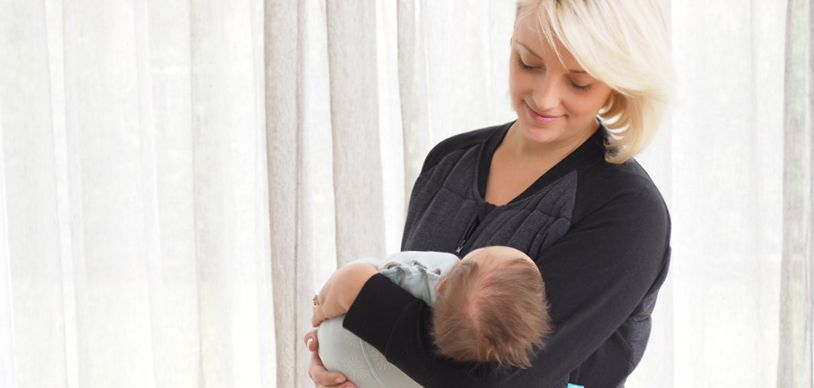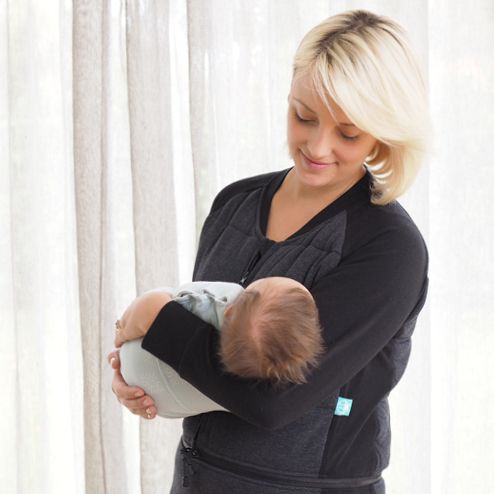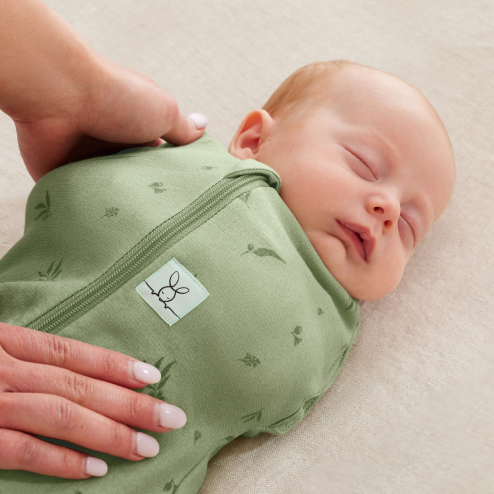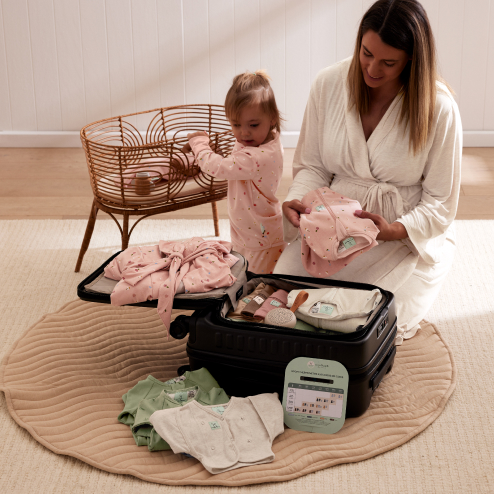
A world of stimuli
Babies are bombarded with new and unfamiliar experiences, which for a newborn, include feeding, bath time, pooing and even going to sleep. It’s hard to imagine what this must be like. Think back to the last time you had heartburn. You knew what it was, and from experience knew that it would pass, even if you couldn’t fix it immediately.
Now try to imagine how upsetting or frightening a stomach ache would be when you have no idea what pain is or what to do about it. A bubble of wind would be an overwhelming experience. It would probably be a sensation that radiates from your tummy to the tip of your toes. This lack of understanding applies to every experience a baby might have.
Without having the brain capacity to make sense of it, it’s no wonder babies seem to be totally overwhelmed and inconsolable at times. It may be a bubble of wind or hunger that your baby is distressed by, but whatever it is, in those first 3 months, especially, babies can be completely stressed out by these internal sensations.
The answer is cuddling
From the outside, you may be a total mystified about why they’re so inconsolable, but for them, it’s genuine, whatever the cause may be. In fact, parents have been observed to accurately detect the cause of distress, about 30% of the time!
Which leaves an enormous amount of trial and error. But don’t let that worry you! As parents, it’s our job try again when we don’t get it right. If nothing seems to be working, then just your calming presence and soothing cuddles are the best options.
Keep cuddling and offering your baby support even when you don’t know what the cause is. Once they are calm, then you can your baby have some time to rest without you, but during distressed times, they need you. Try to remember what a baby needs; is someone to help them through intense emotions.
Tips for settling an unsettled baby
Some things you can try for soothing an unsettled baby in these first 3 months:
- Rhythm, rhythm, rhythm: a constant beat is reminiscent of life in the womb. Walk around, rock or sway rhythmically and hold your baby in close to your body.
- Skin-to-skin contact is a great way to help babies release their feel-good hormones. You don’t need to undress your baby completely, maybe try undoing their clothing until their chest is exposed and do a chest to chest cuddle.
- Have a bath: some babies can’t stay stressed in a nice warm bath, but for others, it is even more stressful, so think about what might be best for your baby.
- Go outside: sometimes, a change of environment helps, so try a walk or step out the back door. Snuggles: being cuddled and feeling contained can help babies calm, as can a snug wrap or swaddle that allow them to move their arms, but not flap around and disturb themselves with that startle reflex.
- Your voice is soothing so try either talking quietly, humming or singing.
- Keep trying: babies may need to experience different positions if they are distressed, so try up on your chest as you cuddle and walk around, or sometimes some tummy time helps. Perhaps your baby might be soothed by being in the sling or baby carrier. Some may settle for sleep after being distressed, yet other babies might just lay there and look at you.
- Be guided by your baby: if they don’t like the position, you have chosen then try another because we can sometimes be so overwhelmed that we keep doing the same thing and wonder why the baby won’t calm. Options are good for babies as well.
Here’s what you don’t want to hear
Babies have developing brains and minimal capacity to soothe themselves. It’s important to remember they can’t control how they feel or react. That means they need you to stay calm in order to help them find calm. Ouch! I know that is a big ask!
It can seem such an impossible thing to ask because parents instinctively become intensely focussed when their babies are distressed. What to do when you can’t do it anymore. When we’re stressed or tired, it can be easy to feel the baby is intentionally making life difficult for us.
Your baby is safer to be left to cry than being in your arms when you are at breaking point. If you feel yourself becoming frustrated and you simply can’t put their needs first, it may be time to put them down safely and walk away for a moment. It’s an emotionally intelligent person who knows their limits. But that is SO much easier said than done.
Putting your baby in the pram or calling for some back up are good tactics to have in place when the going gets tough, and it sometimes does. There is no way you can care for such a tiny being without becoming tired and distressed when they are crying and unsettled, especially when you can’t seem to comfort them.
Ask for help
These are the time when you need to call for assistance. Anyone who’s had a baby knows that we all have moments when we need some support. Take some long slow breaths and try to self calm because you really need to collect yourself so you can, in turn, calm your baby.
If you are feeling overwhelmed, don’t be afraid to call a helpline so you can at least talk to another adult. If you are finding parenting overwhelming, try to remember that this is not new to doctors and nurses, and they are trained to be sure you are supported through difficult parenting times. Together, you and your partner, or your family will be able to spend the hours needed to help a baby calm. Eventually, there will be calm, then eventually, baby sleep.
Keep remembering, this time will pass, and life will become easier for both you and your baby.
Author; Helen Stevens. Clinician, author and researcher. Infant mental health and baby sleep have interested Maternal and Child Health nurse Helen, for several years. For more information and resources go to www.helenstevens.com.au




